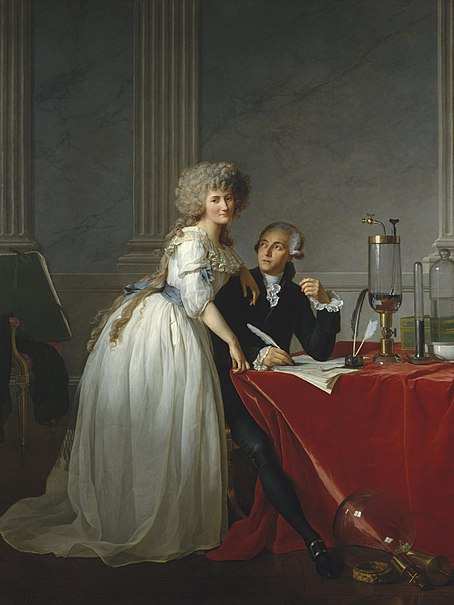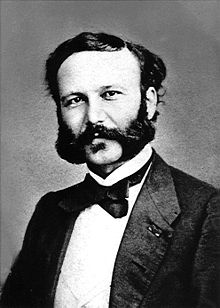 |
| Lavoisier and his pretty wife, Marie-Anne |
Execution of Antoine Lavoisier, 1794
If the name Lavoisier is familiar to you, it's because Lavoisier is generally regarded as the Father of Modern Chemistry. He was also a victim of the French Revolution.Among Lavoisier's accomplishments was the naming of both oxygen and hydrogen, the first comprehensive list of known elements, and the systemization of chemical nomenclature. He also established that sulfur was an element, not a compound as was previously thought, and he worked on the construction of the metric system. Many of Lavoisier's experiments duplicated work that had already been done by other scientists, but it was remarkable in that Lavoisier was one of the first to perform quantitative chemical experiments. By carefully weighing both the reactants and the products of his experiments, Lavoisier established the law of conservation of mass.
Fortunately for Lavoisier, he was born into a wealthy family, inheriting a significant fortune at the age of five when his mother died, which enabled him to finance a life of scientific exploration. At the age of 28 he married the 13-year-old Marie-Anne Pierrette Paulze, who was the daughter of Jacques Paulze, a prominent member of the Ferme Generale, the tax farming organization of pre-Revolution France.
The Ferme Generale had been instituted to help the monarchy out of its financial difficulties. Tax collection, basically, was outsourced to various tax "farmers" or traitants. The traitants paid the Royal Treasury a set sum stipulated in their lease, and then collected the taxes themselves. Originally, tax collection had been farmed out to a wide assortment of individuals, but in 1726 all the farms were organized into one body of 40 farmers, who rapidly became some of the most powerful and wealthy men in the country.
Lavoisier became one of the traitants of the Ferme Generale at the age of 26. By the time of the Revolution, the FermeGenerale was one of the most hated institutions of the Ancien Regime. In addition to his status as a traitant, Lavoisier was singled out by the revolutionaries because he had protected a number of foreign-born scientists from a 1793 law that ordered all foreigners arrested and stripped of their property. He was tried as a traitor, convicted, and executed by guillotine on May 8, 1794.
 |
| Henry Dunant started the whole thing. |
World Red Cross and Red Crescent Day
May 8th is celebrated as World Red Cross and Red Crescent Day, the anniversary of the 1828 birth of Henri Dunant, the founder of the Red Cross.Henry Dunant seems to have been a serious-minded youth. He came from a devout Calvinist family in Switzerland and was active in charitable groups, including the Geneva Society for Alms Giving and the Thursday Association, a group comprised of young men who studied the Bible and gave to the poor. He also spent a great deal of his free time on prison visits and social work. He founded the Geneva chapter of the YMCA and was active in the founding of the International YMCA.
At the age of 21, Dunant began working for a bank, the firm of Lullin et Sautter, and remained with them for a few years. At the age of 28, he formed his own business, a corn-growing and trading company operating in French-occupied Algeria. Having some problems with the local authorities, he decided to speak directly with Napoleon III, and traveled to the emperor's location in the town of Solferino in Lombardy, Italy. For Dunant, it would prove to be a life-changing trip.
At that time, France was fighting with the Kingdom of Sardinia against Austria, which had occupied much of what is now Italy. Dunant arrived in Solferino on June 24, 1859, and discovered the aftermath of a great battle. 38,000 men lay dead and dying on the battlefield and nobody seemed to be doing anything about them. Dunant organized the local civilians to care for them, purchasing supplies himself and putting up temporary hospitals. He urged the civilians, mostly women and girls, to care for all soldiers, regardless of what side they had fought on. The slogan "Tutti fratelli" ("all are brothers") was the watchword of the day.
.jpg) |
| Dunant was horrified by the carnage he saw at Solferin. |
Afterwards, Dunant wrote a book about his experiences in Solferino, Un Souvenir de Solferino (A Memory of Solferino). The book told about the battle and its aftermath and urged the need for a neutral organization that would care for injured soldiers. He printed 1600 copies at his own expense and sent copies to many of the leading military and political leaders of Europe.
The book was well received in Europe, and the President of the Geneva Society for Public Welfare, Gustave Moynier, was especially impressed. A five-man committee was created to study the issue further, comprised of Moynier, Dunant, two doctors, Louis Appia and Theodore Maunoir, and a Swiss army general, Henri Dufour. This was the beginning of the International Committee of the Red Cross.
Disagreements among the committee members began early. Dunant was devoted to the principle that the organization should be politically and nationalistically neutral. Moynier thought that idea was impractical. Dunant continued to present his position to international leaders. Moynier began to edge Dunant out of his leadership position and assume it himself.
Meanwhile, Dunant's altruism had taken its toll on his business interests. In 1868 he declared bankruptcy and was denounced by the Geneva Trade Court for "deceptive practices." Many of his friends and family members had invested in his business and were also ruined. The scandal accompanying Dunant's downfall was great enough that he was called on to resign from the International Committee.
 |
| Moynier worked behind the scenes against Dunant. |
Impoverished and neglected by family and friends, Dunant continued his humanitarian efforts. He founded a relief society during the Franco-Prussian War and argued for disarmament negotiations. He was a co-founder of the Worldwide Common Alliance for Order and Civilization, a forerunner of the Geneva Convention. He also began advocating the idea of an international court to mediate disputes in the future.
In September 1895 a Swiss editor wrote an article about Dunant, calling him the "founder of the Red Cross." The article was reprinted across the continent, and Dunant found himself once more in the public eye. He received a letter from Pope Leo XIII and financial assistance from Maria Feodorovna, widow of Tsar Alexander III and mother of Nicholas II.
In 1901, Dunant received the first Nobel Peace Prize for his role in the creation of the Red Cross and the steps that led to the Geneva Convention. Remarkably, Dunant was considered a controversial choice because his accomplishments, some felt, only served to make war more attractive by eliminating some of its horrors. As a compromise, the Prize was split between Dunant and the pacifist Frederick Passy, who was a founder of the Inter-Parliamentary Union and an organizer of the first Universal Peace Conference. Dunant's portion of the prize money, 104,000 Swiss Francs, was placed directly into a Norwegian bank to protect it from Dunant's creditors. Dunant himself never spent any of the money.
No comments:
Post a Comment